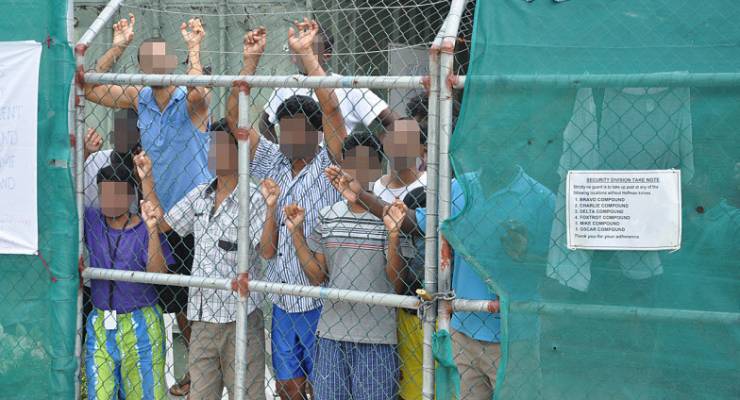
The Messenger was nominated for a Walkey Award. This piece is the reflection of co-creator Michael Green.
I was outside the fish shop in Narooma last month, when Abdul Aziz Muhamat, an asylum seeker currently imprisoned on Manus Island, sent me a text message.
Whenever I pass a fishmonger, I stop and inhale. I get myself an invigorating lung-full of that overpowering, overwhelming, fishy, salty stench whenever I can. I’d been revelling in it — and reflecting upon it — as I was holidaying here with my family, at the fishing town on the NSW south coast where we went every summer when I was a kid.
But as I breathed the pungent, salty, fishy air of my childhood, Aziz sent me a message saying that his uncle had died, back in Sudan. He wrote that he was trying to be strong.
I’ve spoken with Aziz most days for the last year and a half. He’s in the detention centre on Manus Island. When we first got in touch, he wasn’t allowed to have a mobile phone, so he had to use it secretly, hiding in his room. The signal wasn’t strong enough for calls, so we sent each other voice messages instead. We’ve exchanged more than 4000 voice messages, and with the help of other volunteers, typed them all out in a transcript that runs into the thousands of pages. Aziz has been telling me about his life and reporting his experiences in the detention centre. From these fragments, we’ve compiled a podcast, The Messenger.
[Rundle: Manus Island is a catastrophe five years in the making]
In those messages, Aziz has chronicled everything from the mundane — the days of tropical rain — to much bigger concepts, like how he copes with imprisonment. For a long time, Aziz practiced visualisation. He imagined he was boarding at university. His lectures were the lessons he must learn from his daily struggles. His graduation would be his freedom.
While Aziz visualised that scenario, he felt better, he said. It released endorphins. And it reframed the interactions he had with security guards, caseworkers and other detainees. It gave him back the power to learn. Aziz is 25 and because of the violence in Sudan, he didn’t get the chance to finish high school.
Another thing I’ve learnt about Aziz’s situation is that memory — and memories — are difficult. From the first day we spoke, Aziz expressed his frustration: in that place with nothing to do, his memory deteriorates, day after day after day.
After we’d been speaking for several months, I visited Manus Island. Aziz left the detention centre for the first time, to meet me at Lorengau. It was soon after the Papua New Guinea Supreme Court ruled the detention centre illegal, and the conditions of the men’s incarceration had been relaxed slightly, to allow for day leave.
[Refugees on Manus told to prepare for ‘illegal’ detention centre’s closure]
Aziz’s memories began to surface. He saw the seaside and remembered the river near his village. He walked in the trees and remembered his grandma calling out to him when he was a boy, warning him to come away from the forest. Aziz explained to me that his grandma raised him when he was young; she called him her son. That was before the genocide in Darfur, before his family fled their home.
In April, I received a message from Aziz — he’d heard that his grandma had died. His detention continued.
Last month, we released the 10th episode of The Messenger. It was to have been the final episode, but Aziz still doesn’t know what will happen to him. He was thrilled that two dozen of his fellow detainees have finally been granted asylum in the United States, but puzzled that they number so few, after all these years.
As I breathed the pungent, salty, fishy air of my childhood, and celebrated with my family, the situation on Manus Island moved ever closer to its absurd conclusion. The Australian government finally released an alternative accommodation plan for the men — three facilities near the main town on the island. But issued just three weeks before the scheduled closure of the detention centre, the plan has only caused more anguish. Six men detained on Manus Island have died. There is growing resentment towards the refugees from the local community. Aziz doesn’t trust anything he is told anymore. Finally, in a satirical twist, the men have been offered the opportunity to voluntarily relocate to Nauru.
It is a crisis entirely of the Australian government’s creation. The men have staged a peaceful protest every day for the last two and a half months, but Aziz worries they will be treated with violence. His work on The Messenger has been a form of protest, too. He said it helped reinvigorate his memory, gave him more purpose. But in recent months, as the pressure from the Australian government intensified, Aziz stopped sending voice messages. The stress was finally too much. And that, in itself, is a message.
*The Messenger is a joint production of Behind the Wire and The Wheeler Centre







Thank you for that reflection Michael.
It beggars belief this torment is happening on our watch.
Our watch, Australia. What have we become?
Members of the UN Human rights council along with the likes of Egypt and Saudi Arabia